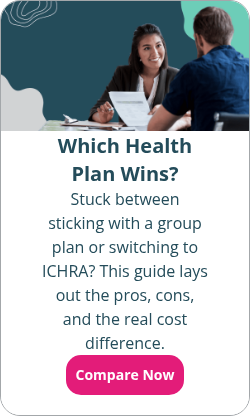How do HSAs and health insurance compare?
By Holly Bengfort on July 10, 2024 at 2:40 PM
Healthcare costs can be a major concern for many employers and employees. Health savings accounts (HSAs) and traditional health insurance plans are two common options for managing healthcare expenses, but they have some key differences. Understanding the ins and outs of these two options can help you decide which one is best for your needs.
In this article, we'll go over how HSAs and health insurance compare. We'll also explain how a health reimbursement arrangement (HRA) may be a better fit for your organization.
Takeaways from this blog post:
- HSAs are savings accounts for medical expenses, while health insurance covers a portion of healthcare costs in return for a monthly premium.
- Contributions to an HSA are tax-deductible, and earnings are tax-free, making it a good option for reducing your employees’ tax burdens.
- HRAs are growing in popularity as an alternative to traditional group health plans. They offer tax-free reimbursements for various healthcare expenses.
What is an HSA?
An HSA is a type of savings account. Individuals make contributions on a pre-tax basis to save for future medical expenses. Individuals can use this money to pay for things like copayments, deductibles, and even certain over-the-counter items.
You must have a qualifying high deductible health insurance plan (HDHP) to open or contribute to an HSA, which has lower premiums but higher out-of-pocket costs than most health plans. Both an employer and employee can contribute to an HSA as long as the sum of these contributions doesn’t exceed the annual contribution limit. The IRS1 updates it annually in Publication 969. Adults 55 or older can also take advantage of catch-up contributions and add an extra $1,000 per year.
Unspent HSA funds roll over each year, serving as a nest egg for future medical expenses. Since contributions to an HSA are tax-deductible and any earnings on the account are tax-free, it's a good option for individuals who want to save money on their healthcare.
What is health insurance?
Health insurance is an agreement where a health insurer covers some or all of your healthcare expenses in return for a monthly payment, known as a health insurance premium. A traditional health plan can cover various medical services, including doctor visits, hospital stays, prescription medications, and preventive care. The goal of a health insurance plan is to help people manage high medical costs by sharing the financial burden among a risk pool that’s managed by an insurance company, making the expenses more affordable for everyone involved.
Individuals can purchase health insurance plans directly from insurance companies on a private exchange or through the Health Insurance Marketplace. Employers often provide group health insurance coverage as part of a benefits package.
Common types of health insurance include:
- Health maintenance organization (HMO): With an HMO, policyholders must select a primary care physician (PCP) for their healthcare needs and must receive a referral from their PCP to consult with a specialist, along with their dependents.
- Preferred provider organization (PPO): A PPO offers policyholders access to a group of preferred healthcare providers and specialists within their network, known as in-network care. However, seeking care outside the network can result in significantly higher out-of-pocket costs for PPO members.
- Point of service (POS): A POS plan combines HMO and PPO elements. Members must pick a PCP but have the option to receive care from out-of-network physicians.
How do HSAs and health insurance compare?
When comparing HSAs and traditional health insurance plans, here are some key points to consider:
|
HSAs |
Health insurance plans |
|
|
Cost |
HDHPs paired with HSAs often have lower monthly premiums than traditional health insurance plans. However, they come with higher annual deductibles. This means individuals may have to pay more in out-of-pocket costs before the insurance coverage kicks in. |
According to KFF2, the average annual cost of employer-sponsored health insurance premiums per employee in 2023 was $8,435 for single coverage and $23,968 for family coverage. |
|
Tax benefits |
HSAs offer triple tax advantages. Employees make contributions with pre-tax dollars, the funds grow tax-free, and withdrawals are tax-free for qualified expenses. |
Employees typically pay for their portion of employer-sponsored traditional health insurance plans with pre-tax payroll deductions, reducing their taxable income. |
|
Savings |
HSAs can be a great way to save for future health expenses, especially if you're in good health and don't expect to incur high healthcare costs anytime soon. |
Traditional health insurance plans provide more immediate coverage but don't offer long-term savings potential since you pay more money upfront. |
|
Flexibility |
With an HSA, individuals have more control over their healthcare expenses. They can use the funds to pay for several out-of-pocket medical expenses such as copays, deductibles, and prescriptions. |
Your level of health coverage and network providers vary depending on the type of policy you have. |
|
Compliance for employers |
Since HSAs aren’t health insurance, they don’t satisfy the Affordable Care Act’s employer mandate for organizations with 50 or more full-time equivalent employees (FTEs). |
Health insurance that meets minimum essential coverage (MEC), minimum value, and affordability standards can satisfy the employer mandate. |
Health insurance provides comprehensive coverage when individuals need it most, while they can use an HSA to pay for medical expenses with the funds they’ve saved up. However, an HSA isn’t a replacement for health insurance.
Is there a better option for employee health benefits?
In the past, the only healthcare coverage available for employers was a traditional group health plan. However, these plans are often more tailored to large corporations rather than small businesses. They’re expensive, rigid, and have high participation requirements that many small business owners can't meet.
Health reimbursement arrangements (HRAs), often mistakenly called health reimbursement accounts, can better support the little guys. They're growing in popularity as an alternative to traditional group health plans. An HRA is an IRS-approved, employer-funded health benefit. Employers use them to reimburse their employees tax-free for more than 200 qualifying healthcare expenses.
Here are some examples of HRA-eligible expenses:
- Individual health insurance premiums (with a stand-alone HRA)
- Doctor visits
- Prescription drugs
- Over-the-counter medication
- Preventive services
- Dental expenses
- Vision expenses
How does an HRA work?
Stand-alone HRAs allow small businesses to provide quality health benefits to their employees without having to pay for a group health insurance policy.
Here's a quick breakdown of how HRAs work:
- The employer sets aside an amount of tax-free money for each employee.
- Employees use their own money to pay for qualified health expenses such as individual health plan premiums, copays, and other medical services.
- They submit proof of those qualifying out-of-pocket expenses to their employer for reimbursement.
- Once the employer or third-party administrator approves the eligible expense, employers reimburse employees up to their allowance amount.
What are the different types of HRAs?
There’s an HRA for every business size and budget.
Here are three of the most common HRAs:
- The qualified small employer HRA (QSEHRA): The QSEHRA is for small businesses with fewer than 50 full-time equivalent employees (FTEs). Employees need policies that provide minimum essential coverage (MEC) to participate in this benefit. The IRS sets annual limits on contributions. Employers can use a QSEHRA to reimburse employees for individual health insurance premiums and out-of-pocket medical expenses.
- The individual coverage HRA (ICHRA): The ICHRA is for employers of all sizes, with no maximum contribution limits. Employers can offer different allowance amounts to different employee classes based on job criteria, such as full-time and part-time. Employees need qualifying individual health insurance policies to participate. An affordable ICHRA allowance also satisfies the Affordable Care Act’s employer mandate for organizations with 50 or more FTEs.
- The group coverage HRA (GCHRA), also known as an integrated HRA, works with group health insurance. It helps cover out-of-pocket expenses that a group plan doesn’t cover or fully pay for. It's a great choice for employers who offer HDHPs to reduce employee out-of-pocket costs.
Why should you offer an HRA?
While there are many benefits to offering HRAs to your employees, here are some of the most significant:
They're accessible to all employers and budgets
Unlike a traditional group health plan, an HRA isn’t subject to annual rate hikes or minimum participation requirements. Employers simply set a monthly allowance that fits their budget. Plus, unused funds stay with the employer at the end of the year and if an employee leaves the organization.
They empower employees
Traditional group health plans are one-size-fits-all. With a QSEHRA or an ICHRA, employees can choose the individual health insurance plans that work best for them.
They offer tax savings
Just like HSAs, HRAs offer tax advantages. With an HRA, reimbursements are free of payroll taxes for employers and free of income taxes for employees.
They promote retention and employee satisfaction
According to our 2024 Employee Benefits Survey, 92% of employees rated health benefits as important. When your employees feel cared for, they’re more likely to stay with your organization instead of looking for better opportunities elsewhere.
How PeopleKeep can help you offer employee health benefits
If you want to offer an HRA as part of your compensation package, PeopleKeep can help. Our team of experts handles the difficult tasks for you so you can focus on running your business.
We simplify the process of offering an HRA by conducting documentation reviews for all employee expenses, offering award-winning customer support, and generating federally required plan documents to ensure compliance and privacy.
Conclusion
Ultimately, the decision between a health savings account (HSA) and a traditional health insurance plan depends on your individual healthcare needs, financial situation, and risk tolerance. With a health reimbursement arrangement (HRA), employers can offer a cost-controlled health benefit that’s more inclusive and tailored to their employees than the one-size-fits-all approach a group health plan provides.
Consulting with a personalized benefits advisor or financial advisor can help you make an informed choice that best fits your needs.
Check out more resources
See these related articles

What is employer-sponsored health insurance?
Learn what employer-sponsored health insurance is in this beginner's guide. Discover how it works and the benefits it offers to employees and businesses.

What are the common healthcare reimbursement models for small businesses?
Learn about the healthcare reimbursement models available for small businesses and find the best fit for your budget and employee needs.

Minimum contribution requirements: Group health insurance vs. HRAs
Confused about employer contribution rules for health insurance and HRAs? This article breaks down the minimum requirements to help you navigate your options.



